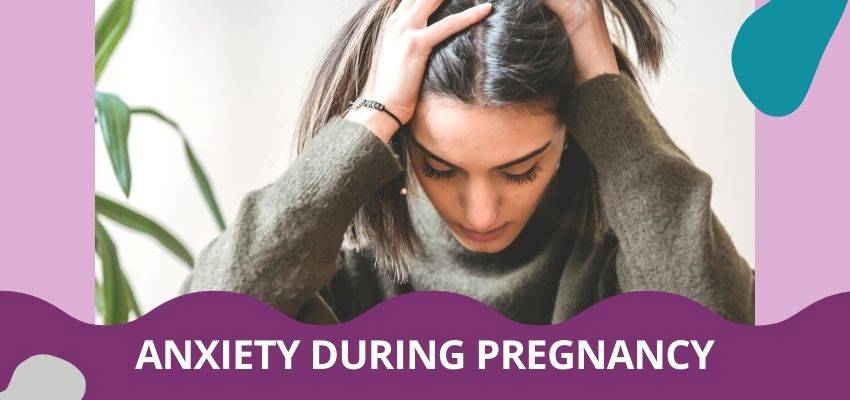Coping with anxiety during pregnancy and following the birth is a real concern irrespective of whether you are a first time parent or adding to your family. Every expecting mother has worries — but if anxiety begins to overwhelm you, it’s important to learn how to control it or seek help. A study [1] indicates that anxiety in pregnancy is associated with shorter gestation and has adverse implications for fetal neurodevelopment. Anxiety during pregnancy is associated with lower birth weight infants with consequences for infant development. Not just for your own sake, you must also pay attention to your worries and anxiety for the sake of the health of your ‘yet-to-be-born’ baby.
Anxiety and Pregnancy
Pregnancy is often looked upon as a time of great joy – that may not be the reality for all women. The adverse, long-term, stable, and sometimes, irreparable effects of anxiety during pregnancy can change pregnancy into an agonizing and unpleasant event of women’s life span.[2]
Anxiety can hit you in any form. You may wonder: Why is the baby kicking so much…or so little? How will I bear the labor pain? How can I be a good mother if I’ve got no clue what it’s like to care for an infant? These are all normal worries. The reality is, nearly every pregnant woman — is a bit anxious, worried or hesitant about some or the other aspect of pregnancy, child-birth or parenting. But when should anxiety be a cause for concern? And how can it be treated during pregnancy? The answers are information that every expecting woman should find.
An Overview of Antenatal Anxiety
Anxiety is a normal response to stress. It’s actually your body’s way to keep you focused. But as they say excess of anything is bad! Because we’re under way too much stress too often, the anxiety begins to be troublesome and seizes to remain productive.
Usually that is what happens during pregnancy. Some expecting moms can remain unaffected with the onset of changes while others tend to worry and worry and inevitably get bogged down with stress and anxiety.
Every mom-to-be has worries — but if anxiety begins to overwhelm you, it’s important to learn how to control it or seek help.
How do I know whether I have antenatal anxiety?
Symptoms of Anxiety during pregnancy

You may have antenatal anxiety if you:
- having excessive worry that’s difficult to control
- have muscles that are tense
- are irritable and find it hard to stay calm
- have recurring thoughts that won’t go away (OCD)
- are having trouble sleeping
- have poor concentration
These symptoms can develop gradually, or you may experience them suddenly and intensely. They can get worse over time if they’re not treated.
Why seek help for anxiety during pregnancy?
Many women are under the mistaken impression that the best way to deal with anxiety is to just put up with it. But if your anxiety is severe and all-consuming, there are a few reasons it’s best to seek help. Although you might tell yourself “I’ll just feel better once the baby is here,” research has actually shown that women who have untreated anxiety during pregnancy are more likely to have severe episodes of postpartum depression after baby is born. So although anxiety and depression don’t necessarily occur together, they are closely related — and by learning ways to control your anxiety before your new little one arrives, you’ll increase the odds that you’ll be able to enjoy those joyful first few months.
And here’s one more reason to explore treatments: Long-term, severe anxiety during pregnancy can affect your baby’s development. Studies have shown that anxiety or depression during pregnancy can increase the odds of preterm birth and low birth weight, and even make it more likely a child will, down the road, have emotional or behavioral challenges.
Treatments for Anxiety during Pregnancy

In case of severe anxiety, you may need medical help to deal with it. All other times, the following measures could help you cope with Prenatal anxiety:
- Catch more sleep. Some research has found that lack of sleep could exacerbate anxiety, so aim for seven to eight hours a night whenever possible. Having trouble sleeping? Let your prenatal expert know and they could help you with certain strategies to help you sleep better.
- Eat whole, fresh foods. A growing amount of research has shown that what you eat can have a big effect on your mental health. Eating a well-balanced diet — nutrient-dense, whole and unprocessed foods (including fruits, vegetables, fish, nuts, dairy and whole grains) — instead of processed and fast foods helps is thought to support healthy bacteria in the gut, which in turn may help lessen anxiety.
- Stay active. Something as quick and easy as a 10-minute walk can decreases levels of tension. Research has found that people who get regular exercise are 25 percent less likely to develop anxiety or depression. If you have been active regularly, then probably you have already succeeded to keep stress and anxiety at bay.
- Stay informed. Learning the ins and outs of pregnancy and parenting can go a long way in helping you feel prepared. So read up and consider taking a childbirth class.
- Build a support system. Spend time with friends who are expecting as well as with experienced parents and consider talking to connect with others who are coping with the same feelings as you.
- Schedule time in your day to relax. Scientists have found that regular meditation and relaxation breathing practices have benefits for people with anxiety. You could also try yoga, listen to music or get a massage from a professional or even just your partner.
Lastly, try to learn to remind yourself that you really will know what to do when your bundle of joy arrives. Even if you’ve never held a baby, instinct is on your side — and what your baby will really need more than anything is simply your love.
Medical References: [1] Anxiety, depression and stress in pregnancy: implications for mothers, children, research, and practice; Christine Dunkel Schetter and Lynlee Tanner; 2012; doi: 10.1097/YCO.0b013e3283503680; https://www.ncbi.nlm.nih.gov/pmc/articles/PMC4447112/ [2] A Review of the Effects of Anxiety During Pregnancy on Children’s Health; Zohreh Shahhosseini, Mehdi Pourasghar, Alireza Khalilian, and Fariba Salehi4; Published online 2015 Jun 8. doi: 10.5455/msm.2015.27.200-202; https://www.ncbi.nlm.nih.gov/pmc/articles/PMC4499279/
